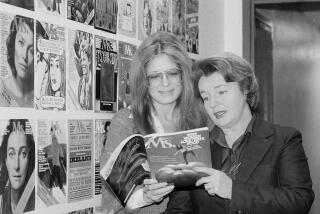Faludi Speaks Up for the Other Side: Men
- Share via
Susan Faludi, best known for her 1992 award-winning and bestselling book “Backlash: The Undeclared War Against Women,” might have been the last person you’d suspect of standing up for men.
But the Los Angeles resident does just that in her new book, “Stiffed: The Betrayal of American Man,” scheduled to arrive in bookstores in coming weeks. In it, Faludi explores the pressure on men to be masculine in a culture that no longer honors traditional codes of manhood.
Excerpts were printed in this week’s Newsweek magazine, which also features Faludi on its cover. Below is an edited version of her live Internet chat Wednesday morning. For a complete transcript, visit https://www.newsweek.com.
Sacramento: In the early 1990s, you were into hassling men about being to blame for women’s and men’s problems in modern society; now, you’ve turned 180 degrees and want to give men a break and some credit: Why have you changed your position so drastically?
Faludi: Actually, if you take another look at my last book, “Backlash,” you’ll see that I wasn’t hassling men. “Backlash” critiqued the many cultural institutions--media, Hollywood, fashion industry, pop-psych publishing, etc.--that told women they should back off their independence. In fact, “Stiffed” is my attempt to do for men what “Backlash” tried to do for women--that is, to say it’s not all in your head; there’s a whole culture out there powerfully shaping attitudes too.
Chicago: Why is it that you attribute so many antisocial behaviors to simple masculinity?
Faludi: Actually, that’s just what I don’t do. One of the popular explanations current in the media is that men’s troubles stem from their biology--Y chromosomes, hormones, etc. But I’m saying that what afflicts men comes more from the society they live in, its economic pressures, its expectations that men be in a perpetual state of dominance and its cultural demands on men to play the bristling-muscled, ever-ready performer. Masculinity is shaped by all of these.
Tucson: I remember the earlier days of feminism, and it would have been the height of blasphemy to allow a man to participate, even remotely, in defining the course of the women’s movement. Do you think the new directions for men need to be determined only by men?
Faludi: Yes, men need to find their own way. That’s why I’ve been careful in this book to listen to men and let them tell their own stories--and it’s why I’m always reluctant to answer that eternal “What should we do?” question.
Pompano Beach, Fla.: I don’t think men have it any tougher than women. Women are supposed to be equal breadwinners, as well as ending up doing most of the housework and rearing the children. On top of that, be feminine. . . . I don’t see men as being under that kind of pressure. Plus, I think women are actually taught to suck it all in.
Faludi: The point isn’t who has it tougher. What was striking to me was how women and men have it tough in this climate for many of the same reasons. The same commercial pressures that hectored women about their appearance and about proving their gender-worthiness through ornamental displays now operate on men. The last thing I want to induce here is a one-upsman(or woman)ship contest about who suffers the most. Rather, this is an area where women and men have a lot, sadly, in common.
More to Read
Sign up for our Book Club newsletter
Get the latest news, events and more from the Los Angeles Times Book Club, and help us get L.A. reading and talking.
You may occasionally receive promotional content from the Los Angeles Times.









